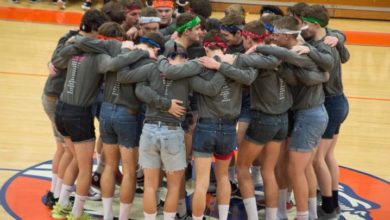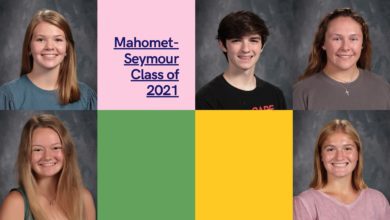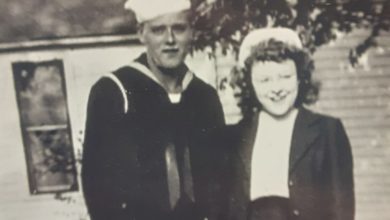Cotner used his love of baseball to share his love of life
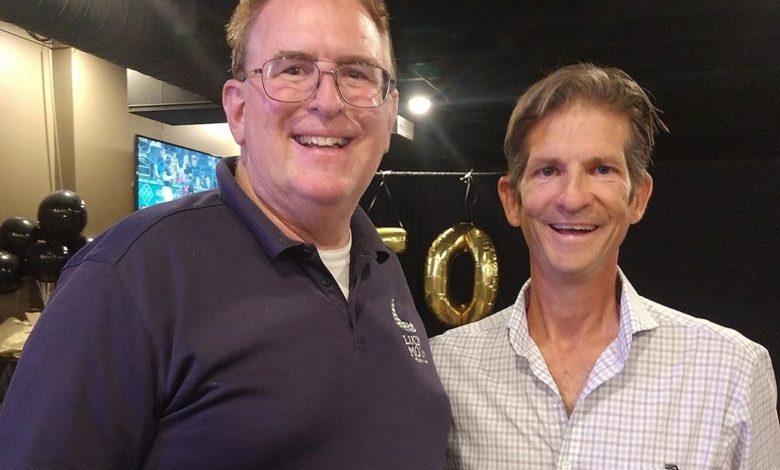
By FRED KRONER
Andrew Cotner is my friend.
That statement is not uniquely singular to myself.
In all likelihood, he has more friends than people that I know.
“Part of it is his personality and his love for life,” said Michelle Ciucci, who got to know Cotner in the 1990s when both were University of Illinois students and working at Gypsy’s. “People want to help him. You’ll do anything for him because you know he’d do anything for you.
“He has always had a good attitude and is a dedicated friend. So, he has a lot of people who really care for him.”
Many people can be categorized. He is this. He is that.
Not Andrew. There aren’t enough categories.
True, he has a passion for baseball – and it has taken the Centennial High School graduate to the highest professional levels – but his track record doesn’t take him down a one-way street.
His interests are varied and widespread. He has a zest for all of them. And, especially for life and living it to the fullest.
He is the person who is in need of a kidney transplant at a time when he is also going through chemotherapy and radiation for throat cancer, yet his thoughts aren’t on how tough the ordeal has been during the past several years.
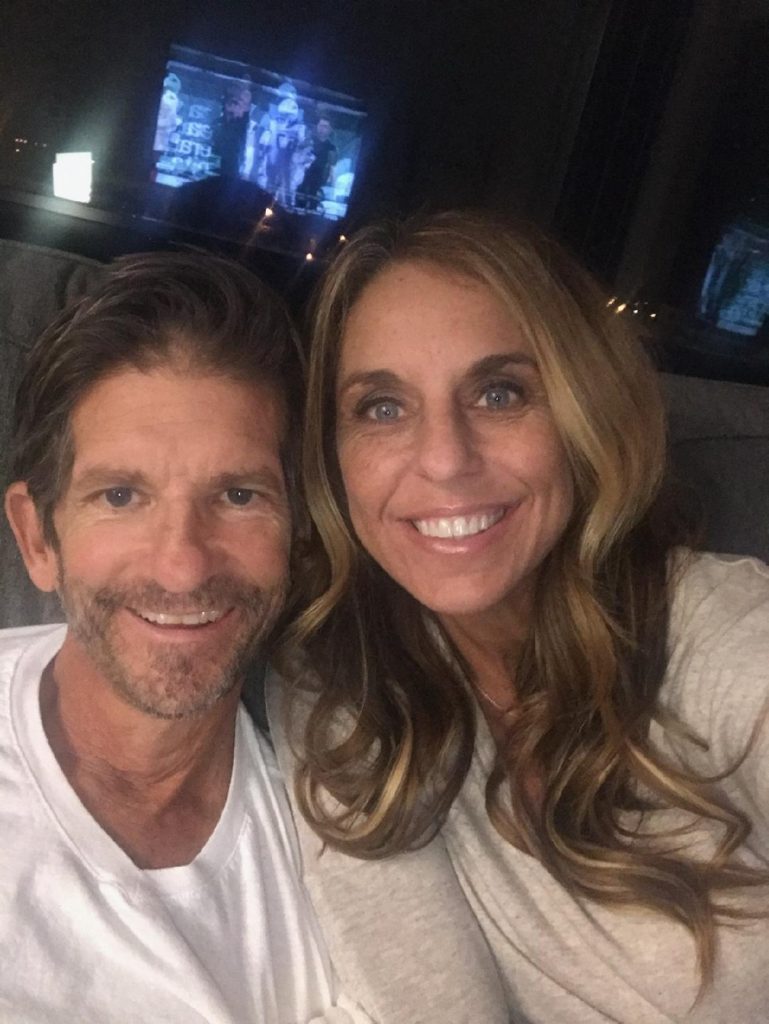
Cotner wants to know how your family is doing, how the business is going, what’s new in your life?
Stacey Perkinson Posey was 13 years old when she met Cotner, a 16-year-old who was playing for the Buckley Dutch Masters. A few years later, they had another chance meeting.
“Fast forward to 1991 and I am in the dorms at Illinois State University and without even a chance to respond, Cotner rolls in delivering Jimmy John’s and says, HEY PERK,” Perkinson Posey said. “That is how Cotner is.
“He never forgot a friend, has always called them by name, and he always makes you feel like you are the only person in the room.”
Cotner is the person who does his best to cheer up those who are down and out even though few people with whom he is in touch can even imagine the depths of down-ness he has experienced.
Since a total laryngectomy in March, 2020, Ciucci said, “He has been non-verbal without a way to communicate.”
Cotner is currently undergoing five weeks of aggressive chemotherapy and radiation treatments, but he remains in a true Catch-22.
He can’t get the strongest doses because of the kidney issues (his function is near 5 percent) and he can’t get on the transplant list until he has been cancer-free for one year. The closest he came was nine months.
“A couple months ago, they found three big ones (tumors) and a lot of lymph node involvement,” Ciucci said. “It was not a good place to operate. They are doing radiation and chemo to shrink the tumor down and buy him a little time.”
Text messages and emails are Cotner’s salvation. When he does communicate, his words speak volumes about his character and mindset.
“One of the things I am thankful for, and that brings me joy, is that I have been given one final blessing by God,” Cotner wrote, in late January.
“To have the knowledge of my death in advance, allows me to say and do all the things I really want to. Most people don’t get this opportunity.
“It’s truly a gift and I want to use it to the fullest.”
**
Cotner took a trip to San Diego recently to visit friends. During Valentine’s weekend, he was in Florida, fishing and spending time with extended family.
At the end of January, he attended a function sponsored by the Buckley Dutch Masters, the amateur Eastern Illinois Baseball League team he started playing for as a teen-ager in the mid-1980s.
Cotner had made a promise that he would be there. His word is his bond.
“If he told you he would be somewhere, he would make it there,” said former Dutch Master Chris Hawkins, who is the baseball head coach at Normal West High School. “That’s never been more true than on a snowy Saturday, (Jan. 30) when he showed up to the annual Buckley cash bash.
“He was observably in a lot of pain, the tumor smothering him, but AC said he would be there and weather and throat cancer couldn’t stop him from backing up his word.”
Cotner is more than a friend to those in his peer group. LaNita Schuster remembers the impression he made years ago.
Schuster’s son, Andy, was a baseball teammate of Cotner’s, both with the Champaign Post 24 American Legion team and later at Illinois State University.
Schuster was a catcher. Cotner was a pitcher. Often, it was Andy throwing to Andy.
LaNita Schuster arrived home in her Champaign neighborhood one day to see Cotner visiting with a neighbor, John Phillips.
“Bob (Schuster, LaNita’s husband) said a little girl had visited who was mentally challenged and he had never seen anybody have the patience and listen to her like Andrew did,” LaNita Schuster said.
Cotner has never been one who could only relate with his peer group.
Perkinson Posey was struck by his willingness to mingle after Dutch Masters’ games had ended.
“Cotner always made time to go and talk to the old Dutch Masters,” Perkinson Posey said. “While all the other guys would gravitate towards the beer cooler, he went straight to the grandstand, where a lot of our old faithfuls sat.
“He would shoot the breeze with them and get their post-game takeaways. He loved to listen to their stories and he definitely appreciated their experience.”
**
Cotner’s heart showed through the first day that he met Isaac Trotter at a baseball game.
“It was my junior year and we (Blue Ridge) were playing in the Sweet 16 of the Class 1A state tournament,” Trotter recalled. “Cotner came to watch Ben Williamson, the stud pitcher. He had worked with Williamson and obviously, the results had paid off big-time.
“I was catching and I had a pretty good game. We came back and won 6-5 in 11 innings, and I had four hits and threw a couple of potential base-stealers out. I made a solid impression and Cotner asked Ben Williamson’s dad (John) if I’d be interested in playing for The Dirtbags, his fall baseball team that was made up of some pretty high-level players in the Central Illinois area.”
John Williamson was sure there would be interest, but didn’t know if the added expense would fit into the family’s budget.
“John explained that money was definitely a big concern for me and my family, but Cotner ate the fee and let me play for free,” Trotter said. “I have no idea why he did that, but it really meant a lot to me.”
Cotner’s understanding of baseball and ability to study players and know their tendencies was nothing short of amazing.
“My first year with the Dutch Masters, I was playing shortstop and (Mike) Dokey was hitting for Tolono,” former Buckley teammate Trent Eshleman remembered. “Cotner was in left field and kept telling me to scoot over to my right, into the ‘5-6’ hole.
“I moved a few steps. He said, ‘More.’ I moved over another step. He said, ‘More.’ I felt like I was already ‘holding hands’ with our third baseman, Dave ‘Gibby’ Gibson.
“I did NOT move over anymore after he had told me. Next pitch, Dokey smoked a hard ground ball single through the hole Cotner told me to move into. I never questioned Andy ‘Magoo’ Cotner again.”
Trotter also marveled at Cotner’s baseball expertise.
“This isn’t a shot at any other coach I had in the past, but Cotner was hands-down the best coach I’ve ever had,” Trotter said. “For the first time in a long time, he unlocked my power.
“I drove the ball that year better than ever before. I was a pretty solid catcher before working with Cotner, but he made me so much more well-rounded. He instilled confidence, but you had to bring it every day because his bar was high.
“I just loved how much he loved the game. Baseball is my one true love. He’s a baseball lifer. It didn’t matter how good each player was. He genuinely cared about each guy and just loved being around the game.”
Trotter’s story is not an isolated example.
“Andrew Cotner has an amazing baseball legacy,” Eshleman said. “Hundreds, maybe thousands, of baseball players, young and old, have learned the game of baseball and been on the receiving end of so many positive experiences and insights.”
**
Cotner was often surrounded by people who knew the intricacies of baseball, some of whom surprised him.
“I remember sitting behind the Triple K on a Sunday night and Cotner saying, ‘WOW! You really know a lot about baseball for a girl,’” Perkinson Posey said. “He proceeded to get an earful from Troy Genzel (former Buckley catcher) about how the women in Buckley know their baseball.”
Perkinson Posey and Cotner didn’t always live within close proximity of each other, but even when separated by distance, they never truly drifted apart.
“As we grew up, started careers and changed locations, we would continue to have that connection,” said Perkinson Posey, a social science instructor at Belleville West. “We could pick up where we left off, whether it had been two weeks or two years.
“He and I also shared a love for health and wellness. As you can imagine, living in a town where cheeseburgers and Budweiser were staples, we caught a lot of crap from our Buckley Dutch Master friends.
“I always say, Cotner was eating kale and making smoothies before it was cool. For years I never knew what he did for a living. It never came up because we were so busy talking about LIVING life. I love the candor that he has always had and the willingness to laugh.”
**
In the fall of 2018, Cotner underwent surgery at the University of Wisconsin/Madison. Ciucci’s husband, Tim (McCulloch) performed the procedure.
McCulloch is an Otolaryngologist, who specializes in head and neck cancer.
“Surgeons are trained and have a robotic surgery program, which allows for much less invasive procedures,” Ciucci said. “Tim did a Transoral Robotic Surgery approach (TORS) through the mouth to remove the cancer in his throat and base of the tongue.
“This spared the larynx (voice box) and face/jaw. We were hopeful this would be the end of the surgery, but there were a few positive lymph nodes, so we needed to keep a close eye on him.”
Immediately after the surgery, Cotner stayed with Ciucci and McCulloch in Madison, Wis.
“Tim got to see the patient out of the hospital and during the weeks of recovery instead of at the one-month follow-up,” Ciucci said. “It was nice to be able to spend time with him.
“He was with two people who could probably help him the most.”
Ciucci, who has her doctorate, is a speech-language pathologist and neuroscientist. She is an Associate Professor of Communication Sciences & Disorders and Surgery/Otolaryngology Head & Neck Surgery at the University of Wisconsin-Madison. She is Associate Chair of the Department of Communication Sciences and Disorders and is Director of the MS-SLP program.
Cotner subsequently returned to his hometown for his followup treatments. A recurrence in his soft palate – a different place – was located and removed locally.
Cotner’s desire to remain active and involved with baseball led to a newfound opportunity last year. He accepted a job as an assistant coach at Ventura (Cal.) College. He began his tenure in January, 2020, while still battling his health issues.
Cotner had been elected to the Centennial Hall of Fame, but the induction ceremony was scheduled for the weekend of Ventura’s first games. Cotner requested that his induction be delayed until 2021, but then COVID-19 forced the 2021 banquet to be postponed indefinitely.
He still hasn’t officially been inducted.
The baseball season for Ventura and Cotner ended almost simultaneously early last spring, but for different reasons. The coronavirus shut down sports.
Health issues prompted a return to the hospital for Cotner.
“In another nine months (after his previous procedure) was the big re-occurrence in the larynx,” Ciucci said. “It was back to Madison for a total laryngectomy, which means he couldn’t talk unless he used an electronic larynx. The larynx is gone and you need a vibratory source. The goal was to have a protheses in place and get amplification in place.
“This is so he could continue coaching.”
The surgery was performed in March, 2020, during the early stages of the COVID-19 pandemic.
“Because of that, he was discharged from the hospital a week earlier than he normally would have been,” Ciucci said. “He was sent home, but there was no speech and swallow therapy available to teach him to take care of his trach. The protheses was infected.
“Because of the multiple surgeries and radiation, swallowing was really difficult and he needed extensive therapy and help maintaining his weight.”
But, the care that Cotner required couldn’t take place because of the pandemic.
“It was COVID’s fault,” Ciucci said. “He wasn’t able to get the normal follow-up. With his poor kidney function, his immune system was bad, which is probably why the cancer keeps reoccurring. His body can’t fight it off.
“He has a wonderful primary care physician (Dr. Dominique Fons), wonderful cancer doctors in Champaign and a very extensive and dedicated friend support system, but he needed ongoing follow-up, home health, therapy appointments AND he can’t talk.
“This was really the worst timing for something like this to happen. Nevertheless, he did really well given the circumstances.”
Cotner did infinitely better, Ciucci said, than she would have done in a similar situation.
“Had it been me, I would have been like, ‘Forget it. I’m not doing this anymore.’” Ciucci said. “He picks up on the bright spots and focuses on that. He is always optimistic and very passionate about everything.
“If it was only cancer, the outcome would probably be different. The kidney screwed up his chances of recovering from the original cancer (in 2016). I’ve seen people go through these things, but not with this kind of bad luck. To me, it was a blow-by-blow bad news, but he bounces back so well.”
Ciucci believes Cotner’s ability to cope with adversity can be traced to having been in that position often in the past.
“I think what also contributed to his resilience was all of the hard things that happened with his mother, Grandma (Ada) Murphy and (brother) John’s wife, Heather (who died at age 35 in June, 2010),” Ciucci said.
Cotner has continued to serve as President of the Eastern Illinois Baseball League, a position he has held since 2015.
His impact has been wide-ranging.
“His tenure has been a challenge because of his illness, but he brought a progressive and forward-thinking attitude and ideas to push the membership towards some changes,” Eshleman said. “His network with the baseball community helped in connecting the E.I. League to some of that network that should be beneficial to the league moving forward.
“He advocated for different rule changes and such, that might bring more excitement for the fans and players. He is always ‘forward thinking’ for the good of the whole.”
Like Cotner, who unselfishly puts others first, Trotter hopes to one day pay forward the lessons he learned from his mentor.
“Cotner is a great man and a great coach,” Trotter said. “I never forgot the grace he showed me about the financial situation in high school. I hope to repay that someday for someone else.”
For years, Cotner has answered to different names: Andrew, Andy, Cot, Drew and Magoo.
Those names may get his attention, but they don’t describe all of the roles he embodies.
“He has an even more amazing legacy as a human being, a man, and a friend,” Eshleman added.
**
Cotner’s early years were marked by both success and heartache.
A football and baseball letterman at Centennial (from where he graduated in 1987), he left the school with pitching records that decades later rank among the Chargers’ all-time bests.
He had an 0.81 earned run average as a senior, a mark that still ranks third all-time at Centennial 34 years after he graduated. Cotner’s season ERA remained the school record for 27 years.
He had 105 strikeouts as a senior, a total that still ranks second all-time for a season at Centennial.
Off the field, he was faced with numerous issues.
He was raised by his mother, Trudi Klein, who became ill with cancer, which she battled valiantly his final year in high school. She died at age 42 in the fall of 1988.
Cotner had a nomadic existence after high school.
He enrolled at the University of Illinois in the fall of 1987 on a baseball scholarship, but transferred to Parkland College for the second semester of his freshman year.
In the fall of 1988, he enrolled at Richland Community College, in Decatur, to be closer to his mother in her final months. He did not play baseball there, but returned to the field during the 1989-90 school year with nationally-ranked Brevard Community College, in Florida.
“He bounced around because he didn’t have the parental influence to stabilize him,” LaNita Schuster said.
At Brevard, Cotner compiled a 5-1 record, which led to a scholarship at Illinois State University, where he led the Redbirds in games started (14) in the 1990-91 season.
A 20th-round draft choice by the New York Mets in 1991, the 6-foot, 190-pound Cotner left school to pursue minor league baseball. In parts of three professional seasons, he struck out more batters than innings pitched (70 in 63 innings) and had an 8-3 cumulative record before an arm injury ended his pitching career.
He then returned to his first collegiate home and earned bachelor and master’s degrees from the University of Illinois.
“Given the chance, he went back and did it,” LaNita Schuster said.
After earning his college degrees, Cotner returned to professional baseball.
Following an internship with the Arizona Diamondbacks, he was hired by the Houston Astros and was the assistant to baseball operations and video coordinator in 2000. In 2001, he was the southwest scouting supervisor for the organization.
Not everything was positive for Cotner during his second season with the Astros.
“That year (2001), Drew was diagnosed with polycystic kidney disease,” Ciucci said. “He had some pain in his gut and I took him to the ER where I was working. They found the kidney disease.”
A two-decade battle with health issues is still ongoing.
**
Cotner’s friends at Buckley occasionally chided him about the knowledge he had.
“Cot is one of the smartest guys I know about many things,” former teammate Hawkins said. “But there are plenty of things that Andrew – like many of us – don’t know much about.
“One of my favorite Cot stories involved him asking a couple of our older and more experienced Buckley players where ducks went when it rained. He truly wanted to know the answer.
“Another time, we were in a bar in Buckley and he asked what the mini-beets were in the bowls on the tables. What he thought were mini-beets, were actually radishes.”
Another memorable story took place when Hawkins wasn’t present, but he heard the tale regaled many times from sources who were there.
“On the charter bus full of Buckley fans and Dutch Master players in 1986 after an E.I. tournament championship, Cotner was caught up in the excitement and stood up as a 16-year-old left-handed phenom surrounded by a bunch of adults,” Hawkins said.
“He started spelling out the famous battle cry – “give me a B, give me a U, give me a K, give me an E, there was a bit of a pause – but the fans just went along with him.
“They ended up spelling “Bukely” under Andrew’s spelling prowess leadership.”
Even on the baseball field, Cotner had moments that caused his teammates to shake their heads.
“Often Andy would hit a routine ground ball and yell ‘do something stupid’ and the ball would take a bad hop over the infielder for a single,” Eshleman said, “or Andy would run through the third base coach’s stop sign and be on course to be out at the plate by 15 feet, but the cutoff man would throw the ball away, and Cotner would score.
“‘Magoo’ is a fitting nickname for Andrew Cotner. Even through this cancer battle, he landed on his feet far longer than most.”
Though Cotner was primarily a pitcher in his early years in baseball, he made his greatest contributions with Buckley as an outfielder and at the plate.
“Andy Cotner is a legend in Buckley and one of the greatest Dutch Masters of all time,” Eshleman said. “His prowess as a player is second to none.”
In 2005, the grandmother with whom Cotner was particularly close, Ada Murphy, passed away. She had fought throat cancer for years.
**
Perkinson Posey and Eshleman traveled to Wisconsin in March, 2020, to see Cotner.
“He was allowed one visitor per day,” Perkinson Posey recalled. “As we were trying to decide who would go first and then who to follow the next day, we get a text from Cotner.
“Even after all he had been through that week, he had the perfect solution. ‘Tell Perk to put on a nurse costume and we can all be together.’ He was a little disappointed when I walked in his room with everyday clothes on.
“We laughed and cried a lot that day. But, he was still his witty, genuine self. With COVID and his risk, they told us no touching or hugging but again, he had an idea. The next thing you know, we both had doubled gloves on and we were holding hands. This guy always finds a way to make things happen.”
The best tribute, Perkinson Posey said, is that the 51-year-old Cotner remains true to himself and his values.
“He has never been afraid to show his emotions,” Perkinson Posey said. “On the baseball field, telling a story, training a hitter, coaching a team, or listening to a friend, the strength of Andy has always been in his heart.”
Throughout his assortment of major health concerns, there has never been a problem with Cotner’s heart. Just ask his many friends.

